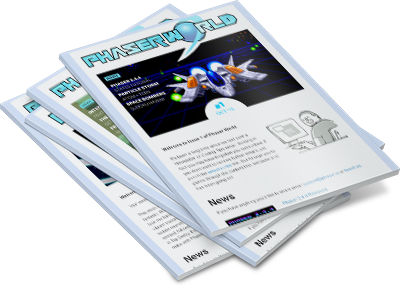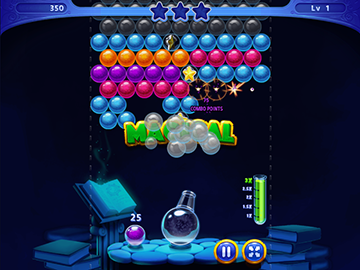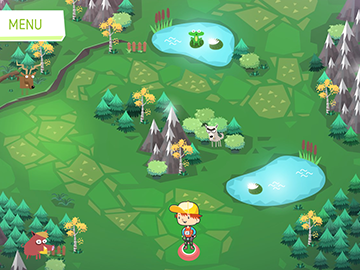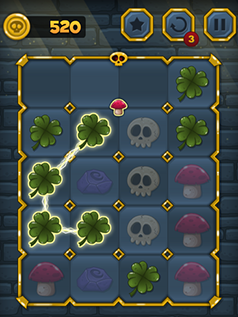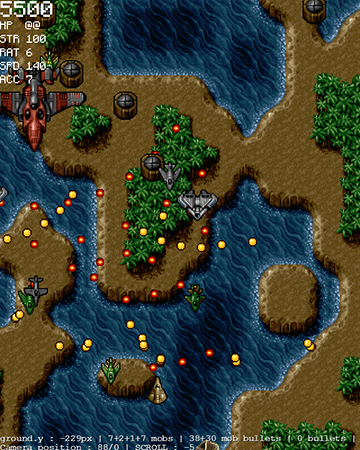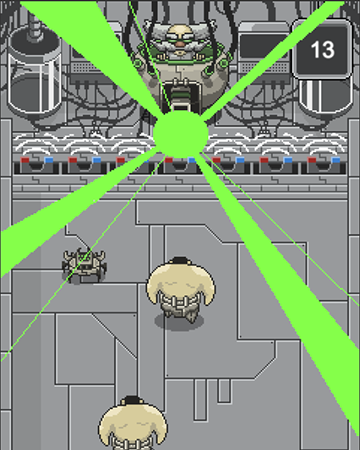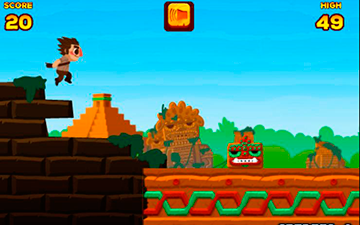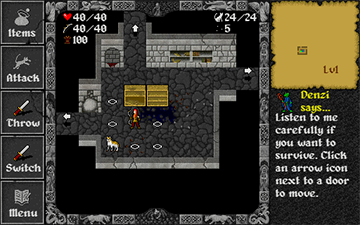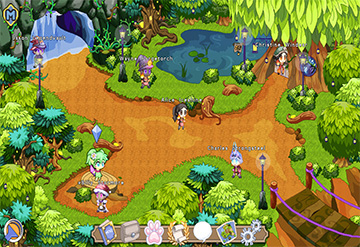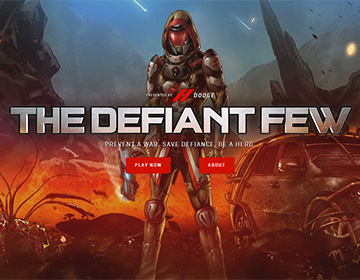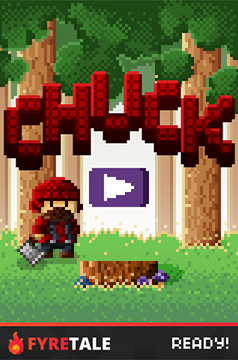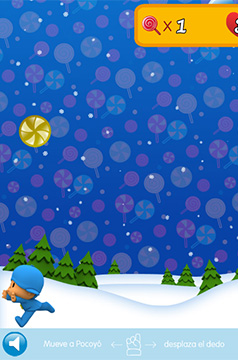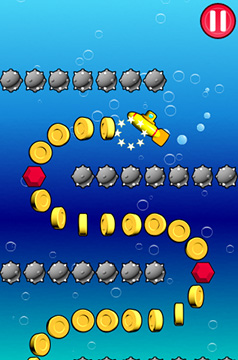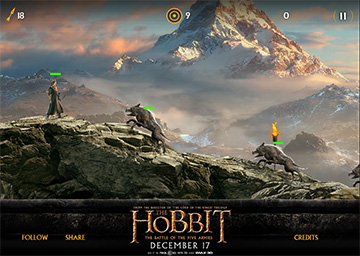Phaser is a fast, free and fun open source HTML5 game framework. It uses a custom build of Pixi.js for WebGL and Canvas rendering across desktop and mobile web browsers. Games can be compiled to iOS, Android and desktop apps via 3rd party tools like Cocoon, Cordova and Electron.
Along with the fantastic open source community Phaser is actively developed and maintained by Photon Storm Limited. As a result of rapid support and a developer friendly API Phaser is currently one of the most starred game frameworks on GitHub.
Thousands of developers worldwide use it. From indies and multi-national digital agencies to schools and Universities. Each creating their own incredible games. Grab the source and join in the fun!
- Visit: The Phaser website and follow on Twitter (#phaserjs)
- Learn: API Documentation, Support Forum and StackOverflow
- Code: 700+ Source Examples (also available in this git repo)
- Read: Subscribe to the weekly Phaser World Newsletter
- Chat: Join our Slack Channel, or #phaserio IRC channel
- Extend: With Phaser Plugins
- Be awesome: Support the future of Phaser on Patreon or by buying our books
- What's New?
- Support Phaser
- Phaser World
- Download Phaser
- Getting Started
- Using Phaser
- Games made with Phaser
- Requirements
- Road Map
- Change Log
- Lazer
- Contributing
19th May 2016
The release of Phaser 2.4.8 continues our commitment to rapid turn-around of bug fixes and enhancements. Scan through the Change Log for comprehensive details about what is new and updated in this version.
As always, my thanks to all of you who contributed towards this release. Either by opening an issue on GitHub, providing a fix, or just giving encouragement to the dev team.
We are now splitting our time between development of Lazer, and Phaser 2.5. We decided, after much discussion with the community, that we owed it to Phaser to go out on a high, so 2.5 will be the version in which we do just that. After this Phaser will enter the LTS (long-term support) stage of its life.
This is when we impose a feature freeze, locking the API down and responding only to bugs. This is a necessary step to allow us to focus on Lazer while still ensuring Phaser is given the support it deserves. Don't worry, we aren't going to abandon you! We've got your backs.
As always, keep you eyes on the Phaser web site and read our weekly newsletter. You can also follow me on Twitter or chat to me in the Phaser Slack channel.
We'd be extremely grateful if you could get involved with our Phaser Patreon campaign. The uptake so far has been fantastic. Thank you to everyone who now supports Phaser development and shares our belief in the future of HTML5 gaming, and Phasers role in that.
Happy coding everyone! See you on the forums.
Cheers,
Rich - @photonstorm
Please help support the future development of Phaser / Lazer through our Patreon campaign. We've some exciting plans and there's so much we'd like to do.
Phaser is sponsored by the following great companies:
QICI Engine: A powerful one-stop integrated Phaser game editor
Zenva Academy: Online courses on Phaser, HTML5 and native app development
Every Friday we publish our newsletter: Phaser World. It's packed full of the latest Phaser games, tutorials, videos, meet-ups, conference talks and more. We also post regular development updates, and occasionally special offers.
Phaser is hosted on Github. There are a number of ways to download it:
- Clone the git repository via https, ssh or with the Github Windows or Mac clients.
- Download as zip or tar.gz
- Download just the build files: phaser.js and phaser.min.js
- Checkout with svn
Install via bower
bower install phaser
Install via npm
npm install phaser
Using Browserify? Please read this.
jsDelivr is a "super-fast CDN for developers". Include the following in your html:
<script src="//cdn.jsdelivr.net/phaser/2.4.8/phaser.js"></script>
or the minified version:
<script src="//cdn.jsdelivr.net/phaser/2.4.8/phaser.min.js"></script>
cdnjs.com also offers a free CDN service. They have all versions of Phaser and even the custom builds:
<script src="https://cdnjs.cloudflare.com/ajax/libs/phaser/2.4.8/phaser.js"></script>
If you'd like to try coding in Phaser right now, with nothing more than your web browser, then you can head over to the Phaser Sandbox. You'll find Quick Start templates and a user-friendly editor filled with handy code-completion features.
Want to try Phaser without downloading anything? The site Koding offer a complete browser-based virtual machine to work in, allowing you to clone the Phaser repo and start work immediately.
Phaser is released under the MIT License.
We have a Getting Started Guide which covers all you need to begin developing games with Phaser. From setting up a web server, to picking an IDE and coding your first game. Please start here no matter what your game-dev experience, before diving in to the API.
The single biggest Phaser resource is the Phaser web site. It has hundreds of tutorials listed and fresh ones are added every week. Keep coming back to see what's new!
Using Phaser with TypeScript? Check out this great series of Game From Scratch tutorials.
Prefer videos to reading? Lynda.com have published a video based course: HTML5 Game Development with Phaser (requires subscription)
Ever since we started Phaser we've been growing and expanding our extensive set of source code examples. Currently there are over 700 of them!
Browse the Phaser Examples or clone the examples repo and eat your heart out!
Interphase is a programming book for Phaser developers of all skill levels.
With 400 pages of content you'll find detailed articles, game development "Making Of" guides and tutorials. All were written using the latest version of Phaser, so you won't be learning any out-dated tricks here.
As well as the book you get all the source code, graphics and assets to go with it, and lots of extras too.
Phaser Editor is a brand new Eclipse based editor that offers lots of built-in tools specifically for Phaser developers. Handy features include Smart code auto-completion, built-in web server, documentation search, asset management, texture atlas creator, audio sprite creator, asset previews and lots more.
The Game Mechanic Explorer is a great interactive way to learn how to develop specific game mechanics in Phaser. Well worth exploring once you've got your dev environment set-up.
MightyEditor is a browser-based visual Phaser game editor. Create your maps with ease, position objects and share them in seconds. It also exports to native Phaser code. Excellent for quickly setting-up levels and scenes.
Phaser is provided ready compiled in the build folder of the repository. There are both plain and minified versions. The plain version is for use during development and the minified version for production.
Phaser includes a grunt based build system which allows you to strip out lots of additional features you may not require, saving hundreds of KB in the process. Don't use any Sound in your game? Then you can now exclude the entire sound system. Don't need Keyboard support? That can be stripped out too.
As a result of this work the minimum build size of Phaser is now just 80KB minified and gzipped.
See the Creating a Custom Phaser Build tutorial for details.
Phaser was never written to be modular. Everything exists under one single global namespace, and you cannot require selected parts of it into your builds. It expects 3 global vars to exist in order to work properly: Phaser, PIXI and p2. The following is one way of doing this:
window.PIXI = require('phaser/build/custom/pixi')
window.p2 = require('phaser/build/custom/p2')
window.Phaser = require('phaser/build/custom/phaser-split')
If you build a custom version of Phaser (see above) it will split the 3 core libs out into their own files, allowing you to require them as above.
We appreciate this is just a band-aid and not a proper use of modules, but please understand it was never built to be used this way. You're trying to fit a square peg in a round browserify-shaped hole, so compromises have to be made. Please don't open GitHub issues about it. We've no intention of changing Phaser at this stage of its life. Full module based development is being undertaken in Lazer.
Starting from Phaser 2.4.5 we now include a custom build for Webpack.
You need to add p2 as a dependency.
var path = require('path');
var webpack = require('webpack');
var phaserModule = path.join(__dirname, '/node_modules/phaser/');
var phaser = path.join(phaserModule, 'build/custom/phaser-split.js'),
pixi = path.join(phaserModule, 'build/custom/pixi.js'),
p2 = path.join(phaserModule, 'build/custom/p2.js');
module.exports = {
...
module: {
loaders: [
{ test: /pixi.js/, loader: "script" },
]
},
resolve: {
alias: {
'phaser': phaser,
'pixi.js': pixi,
'p2': p2,
}
}
...
}
require('pixi.js');
require('p2');
require('phaser');
Should you wish to build Phaser from source you can take advantage of the provided Grunt scripts. Ensure you have the required packages by running npm install first.
Run grunt to perform a default build to the dist folder.
Thousands of games have been made in Phaser. From game jam entries to titles by some of the largest entertainment brands in the world. Here is a tiny sample:
Artwork copyright their respective owners.
We add new games to the Phaser site weekly, so be sure to send us yours when it's finished!
Phaser requires a web browser that supports the canvas tag. This includes Internet Explorer 9+, Firefox, Chrome, Safari and Opera on desktop. iOS Safari, Android Browser and Chrome for Android are supported on mobile.
While Phaser does its best to ensure a consistent cross-platform experience, always be aware of browser and device limitations. This is especially important with regard to memory and GPU limitations on mobile, and legacy browser HTML5 compatibility.
If you need to support IE9 / Android 2.x and use P2 physics then you must use the polyfill in the resources/IE9 Polyfill folder. If you don't use P2 (or don't care about IE9!) you can skip this.
Phaser is developed in JavaScript. We've made no assumptions about how you like to code and were careful not to impose a strict structure upon you. You won't find Phaser split into modules, requiring a build step, or making you use a class / inheritance OOP approach. That doesn't mean you can't do so, it just means we don't force you to. It's your choice.
If you code with TypeScript there are comprehensive definition files in the typescript folder. They are for TypeScript 1.4+.
The majority of Phaser development is now taking place on the Lazer (Phaser 3) project. The Phaser 2 branch will still be supported and issues fixed, but roadmap features have been migrated over.
Lazer is the next generation of the Phaser game framework, and was previously called Phaser 3. Using a completely ES6 base it is renderer agnostic, allowing for DOM, SVG, Canvas and WebGL rendering, across desktop and mobile web browsers.
Lazer is in active development but is not yet ready for production use.
You can read all about the philosophy behind Lazer here or join the Google Group mailing list where progress reports are posted. You can also follow progress in the Phaser World newsletter.
- BitmapData.copy, and by extension any method that uses it, including BitmapData.draw, drawGroup and drawFull, now all support drawing RenderTexture objects. These can either be passed directly, or be the textures of Sprites, such as from a call to generateTexture.
- Arcade Physics has had a new
worldargument added to the following functions:distanceBetween,distanceToXY,distanceToPointer,angleBetween,angleToXYandangleToPointer. The argument (which is false by default), when enabled will calculate the angles or distances based on the Game Objectsworldproperty, instead of itsxandyproperties. This allows it to work for objects that are placed in offset Groups, or are children of other display objects (thanks @Skeptron for the thread #2463) - Arcade Physics Body has a new property
worldBounce. This controls the elasticity of the Body specifically when colliding with the World bounds. By default this property isnull, in which case Body.bounce is used instead. Set this property to a Phaser.Point object in order to enable a World bounds specific bounce value (thanks @VitaZheltyakov #2465)
- TypeScript definitions fixes and updates (thanks @osev7 @staff0rd @galen-manuel)
- Docs typo fixes (thanks @dedoubleyou1 @mortonfox @zeterain)
- You can now access the intensity of the Camera shake effect via the getter / setter
Camera.shakeIntensity. Useful if you wish to tween the intensity while running. (thanks @drhayes #2443) - The Arcade Physics overlap method would return false if two bodies were overlapping but neither had any velocity (i.e. they were embedded into each other)
- PIXI.defaultRenderer is now set to
nullin Game.destroy, allowing it to be reset if a new Game instance is created on the same page (thanks @xtforgame ##2474) - BitmapData.drawGroupProxy is now capable of iterating through Sprites that have children, and also now uses the world positions for drawing instead. This change updates the functionality of BitmapData.drawGroup.
- Text.setStyle has a new argument
updatewhich will optionally automatically callupdateTextafter setting the new style (thanks @staff0rd #2478)
- Fixed an issue in the Arcade Physics overlap method where it would only detect overlaps up to the max bias threshold and no further (thanks @rgk #2441)
- InputHandler.checkPointerDown and checkPointerOver will now test the worldTransform scale property of a Sprite. If zero it will fast return, where-as before it would incorrectly report an up event (thanks @jaapaurelio #2466)
- Fixed a bug in Arcade Physics Body.preUpdate which would incorrectly apply the position of an offset Body (one which has had Body.setSize used on it) when combined with a Sprite with a non-zero anchor (thanks @SBCGames #2470)
- If you set Game.renderType to
Phaser.HEADLESSit will no longer render the output to the canvas. The canvas is still created (although not added to the DOM), as it's required internally, but no rendering now takes place on it (thanks @ForgeableSum #2464) - Sounds played using the Audio tag, that were paused and then resumed again (either directly in code, or via a game pause event) would not resume from the point at which they paused (thanks @rroylance #2473)
- Sounds played using the Audio tag, set to loop, would get caught in an endless pause-play loop cycle (thanks @rroylance #2473)
Please note that Phaser uses a custom build of Pixi and always has done. The following changes have been made to our custom build, not to Pixi in general.
- Sprites that had a tint on them, that then had their frame changed via either
Sprite.frameorSprite.frameNamewouldn't re-tint the new frame, and would become stuck on the old frame in Canvas mode (thaks @spayton #2453)
For changes in previous releases please see the extensive Version History.
Please read the Contributors Guide for full details on helping with Phaser, but the main points are:
-
Found a bug? Report it on GitHub Issues and include a code sample.
-
Pull Requests should only be made against the
devbranch. Never againstmaster. -
Before submitting a Pull Request run your code through JSHint using our config.
-
Before contributing please read the code of conduct.
Written something cool that shows Phaser in use? Please tell us about it in our forum or email: [email protected]
Phaser is a Photon Storm production.
Created by Richard Davey. Powered by coffee, anime, pixels and love.
The Phaser logo and characters are © 2016 Photon Storm Limited.
All rights reserved.
"Above all, video games are meant to be just one thing: fun. Fun for everyone." - Satoru Iwata








